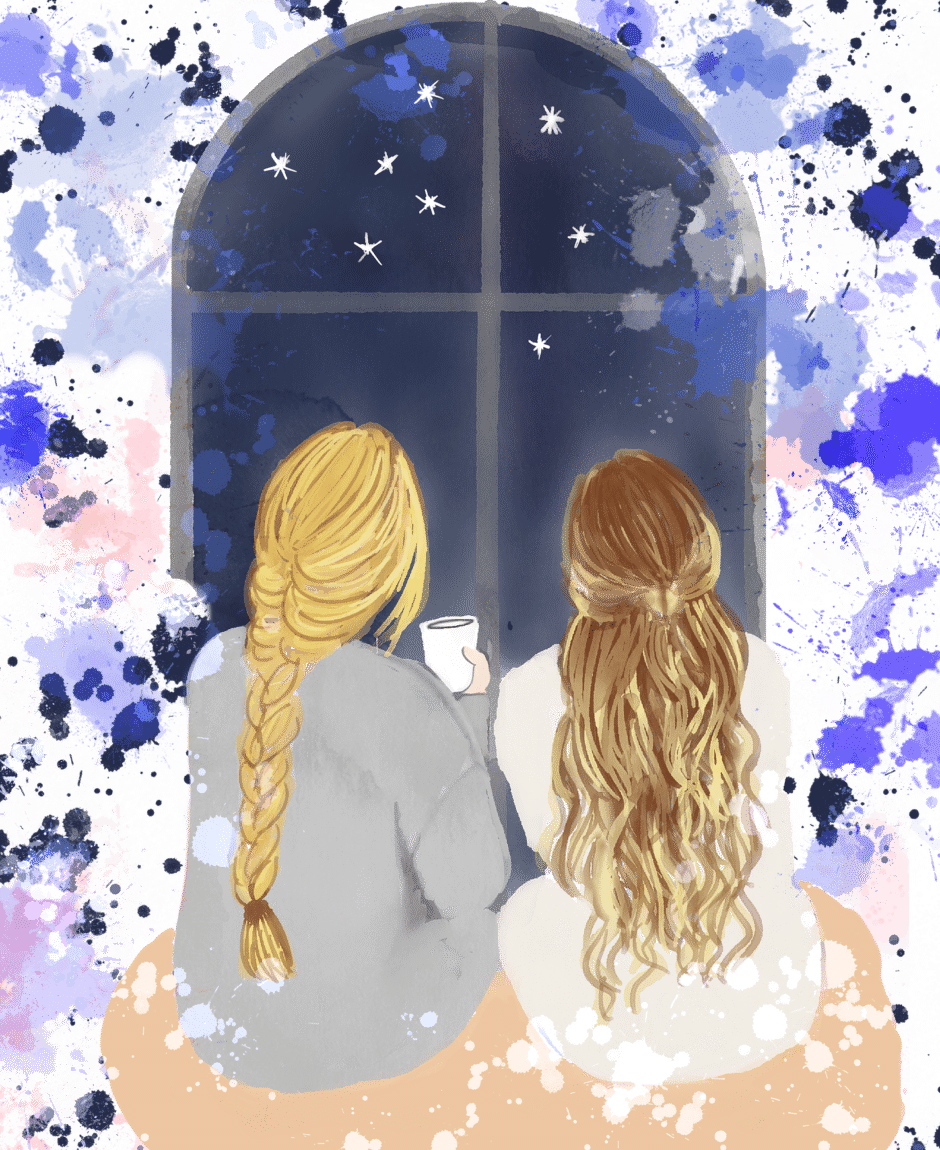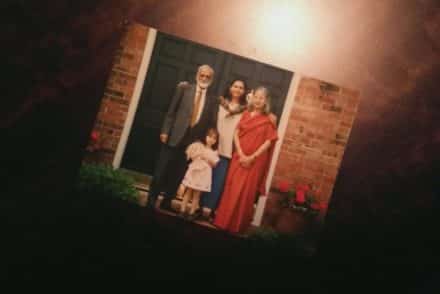By Christine Meade
My sister is moving with her husband and my twin toddler nephews to North Carolina in two weeks. That’s 811 miles away from her family of origin. They’re moving during a pandemic and only four months after I gave birth to my first son and I want it to be about me and tell them not to leave, but I know that’s not how this works. I’m dreading the day–the one when we’ll have to say goodbye–and the ugly tears I’ll cry. I wanted her to have the chance to fall in love with my son as much as I did with hers.
When my grandmother and her sister–Rita and Ruth–bought their first homes in Somerville, MA, with their WWII vet husbands in the fifties, they found two-family, white houses that mirrored each other on the same street. They each had a slew of kids who grew up as close as siblings. They would spend hours chatting on the phone to one another just across the road, giggling with the coiled phone cord wrapped around a finger when they couldn’t be together in person. They only wore heels when out walking, pushing their prams and chatting. One time, a drunk man dangled out a second floor window and shot at them as they brought their kids for a walk. When I imagine this, I picture their heels first–stilettos in a bright green color–panty-hosed knees bent ducking behind a car with their children huddled like ducklings around them. No one was hurt, and they made the newspaper.
The grandmother I knew had toes that were curled and feet curved with bunions. She always wore stockings with slippers in the house. It’s from wearing those heels, she’d say, without a hint of regret. She lived across from her sister until she passed away in 2007.
When my sister was little, I had her drink out of the dog bowl on the floor when we played “dog.” I had her squirmy body sit through rigorous school lessons that she was far too young to understand when we played “school” and I, as teacher, would get frustrated when she’d get bored and drop out. She could only read my books if she used the check-out system and library card I had created for her. I bribed her to do things by offering to “be her best buddy” when she was little, which she couldn’t refuse. She followed me around and copied what I said and wore and wanted to be until she was too old to get away with it. In a home video we found recently of the two of us as little kids in matching Minnie Mouse shirts before our brother came along, I told her “I loved you even when you were ugly.”
And then we got to high school and discovered the joys of having a close sister friend. We were three grades apart and we’d steal each other’s clothes and walk the hallways together, looking nothing alike, but liking the way “The Meade Sisters” sounded on other people’s tongues. It’s hard to feel lonely when you’re part of a team–a team that you can never opt not to play for. We were the funniest people we knew. Our family started referring to us as Rita and Ruth.
I went to college and moved to San Diego and then San Francisco and spent the better part of my twenties in California and I wonder now if this is how she felt to be the sister that stayed behind. If it’s what I’ll feel when she’s gone, except maybe worse, because the missing extends beyond her to the two little boys she created who have big eyes and big foreheads and call me Nini.
While in California, we’d talk on the phone and call each other by our nicknames and she’d visit and I’d take her to the best beach bars and Alcatraz and the Muir Woods. We handmade matching Halloween costumes and danced until we were sweat-slicked and tired. On bad nights, with ex-boyfriends, I’d lie awake in bed until 3 a.m. so it would be 6 a.m. her time and I’d call her for consolation.
When I moved back to Boston we made our own new set of traditions. We’d go to Salem every October for my birthday and get our fortunes read. When we were hungover, we’d order egg sandwiches and watch Blue Crush for the 100th time, a movie we loved because maybe it was a life we imagined for ourselves one day–simple beachside living, surfing, and sisterhood. I read online recently that 2020 is the eighteenth anniversary of Blue Crush, which made me feel old. To celebrate the 2002 film, the movie’s stars met on Zoom, which made me feel sad because maybe that’s what all ocean-loving, free-wheeling sisters have to settle for now–a quick video chat to connect.
As an adult, my sister became a nurse and a wife and then a distance settled between us. She wouldn’t answer my calls, and text responses came through a day too late. She was wrapped up in love’s arms and couldn’t be bothered with the trivialities of others’ day-to-day. I resented her or maybe more so him, but maybe that is love, I thought, since I was single at the time and couldn’t quite remember the flavor of that word in my own mouth. Maybe I’d do the same, I thought. Maybe I’d leave my sister for love. But I didn’t think so.
Then she had the twin boys and her role shifted. She became a mom, this place I knew nothing about. In motherhood, however, she needed me again, if only for the companionship, for a salve to the loneliness, the exhaustion. It’s a circumstance I only now understand, baby in my arms, calling her or my mother multiple times a day just to fill the blank space between feedings and diaper changes. The companionship needed in motherhood goes far beyond a spouse or a partner, I’ve found, but rests in other mothers whose bodies have been torn by the ones they love most. It rests in those who’ve been so stripped of sleep, they need to talk to someone who understands when they don’t have anything at all to say. When I became pregnant, our roles shifted again, and I needed my sister because why did my nipples hurt so much? And was crying this much normal? And would I ever–would he ever–sleep again?
A few months after the birth of her twins, my sister’s husband was deployed for a year and I had her back, all to myself. I got daily video calls and we saw each other a few times a week. I had visions of our boys growing up like brothers, only a year and a half apart, maybe going to the same school. We’d wheel them to the park together in strollers, carrying our iced coffees, and gossiping about the rest of our family. We’d take turns babysitting for the other and share big meals over loud dining room tables, our kids wrestling in the other room like Rita and Ruth’s boys.
Now her husband is back and they are leaving just to try something new. It will be her first time living in a different part of the country and there’s so much that I want to tell her. That it will be harder living that far away from a family as close as ours than she realizes. I remember my first night away after moving, crying quietly on my blow-up mattress, missing my family, the only home I had known for so long. That missing all the birthdays and barbecues and holidays feels isolating in a way you wouldn’t expect. That no matter how nice the place you moved to is–sunshine, beaches, all the promise of happiness–nothing replaces those random Tuesday night dinners around our parents’ kitchen island, drinking good red wine and laughing and eating with your siblings, and feeling, if nothing else, grateful.
And I would tell her, most importantly, that I love her and will miss her.
Christine Meade is a Boston-area writer and editor and first-time parent. She is the author of the award-winning novel “The Way You Burn.” Christine has published articles and essays for Dow Jones Media, The Boston Globe, Writer’s Digest, HuffPost, and GirlTalkHQ. She can be found online here: www.christine-meade.com.
Anti-racist resources, because silence is not an option
~~~~~~~~~~~~~~~~~~~~~~~~~~~






No Comments